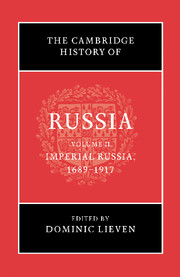Book contents
- Frontmatter
- Introduction
- Part I Empire
- Part II Culture, Ideas, Identities
- Part III Non-Russian Nationalities
- Part IV Russian Society, Law and Economy
- Part V Government
- 20 Central government
- 21 Provincial and local government
- 22 State finances
- Part VI Foreign Policy and the Armed Forces
- Part VII Reform, War and Revolution
- Bibliography
- Index
- Map 5. The Russian Empire (1913). From Archie Brown, Michael Kaser, and G. S. Smith (eds.) Cambridge Encyclopedia of Russia 1982.">
- Plate Section">
- References
20 - Central government
from Part V - Government
Published online by Cambridge University Press: 28 March 2008
- Frontmatter
- Introduction
- Part I Empire
- Part II Culture, Ideas, Identities
- Part III Non-Russian Nationalities
- Part IV Russian Society, Law and Economy
- Part V Government
- 20 Central government
- 21 Provincial and local government
- 22 State finances
- Part VI Foreign Policy and the Armed Forces
- Part VII Reform, War and Revolution
- Bibliography
- Index
- Map 5. The Russian Empire (1913). From Archie Brown, Michael Kaser, and G. S. Smith (eds.) Cambridge Encyclopedia of Russia 1982.">
- Plate Section">
- References
Summary
Introduction
A study of the central government of the Russian Empire sheds light on three important issues in the imperial era. How well did the institutions handle the challenge of modernisation from above? How did the autocracy’s and bureaucracy’s view of their respective roles in society change over time? What were the major challenges related to effective governance from the centre and how did the monarchy and bureaucracy handle them? By extension a solid understanding of the workings of central government helps to determine the extent to which it and its personnel held responsibility for the collapse of the Romanov regime.
Peter the Great’s reform of the central government marked the beginning of the imperial bureaucracy’s evolution on two different but equally important and mutually linked levels. The ministerial bureaucracy from the early nineteenth century staffed the so-called subordinate organs (podchinennye organy), which at least theoretically handled activities in a designated field, such as finance or foreign affairs. The supreme organs (verkhovnye organy) had the responsibility to manage and co-ordinate the activities of the subordinate organs. The effectiveness of government depended on cadres at least as much as institutions. Indeed, Konstantin Pobedonostsev, well-known conservative and tutor to the last two emperors, Alexander III and Nicholas II, frequently stressed, ‘Institutions are of no importance. Everything depends on individuals.’ Whilst his categorical rejection of the role of institutions is highly debatable, we do need to take into account the dynamic between institutions and human agents, the most important of whom was the emperor, in order to obtain a more coherent understanding of how the central organs actually functioned.
Keywords
- Type
- Chapter
- Information
- The Cambridge History of Russia , pp. 427 - 448Publisher: Cambridge University PressPrint publication year: 2006
References
- 1
- Cited by



